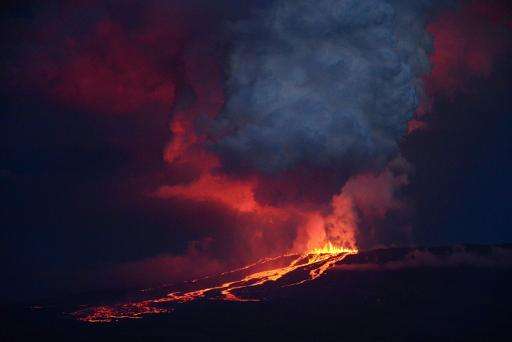Fears for pink iguanas as Galapagos volcano erupts

A volcano in the Galapagos islands erupted for the first time in more than 30 years Monday, sending streams of lava flowing down its slopes and potentially threatening the world's only colony of pink iguanas.
The Galapagos National Park warned on Twitter that Isabela Island, where Wolf volcano erupted at dawn, holds "the world's only population" of the iguanas, Conolophus marthae, also known as the Galapagos rosy iguana.
Park officials told AFP they were not immediately able to establish whether the iguanas were at risk from the eruption.
A tourist boat passing by the uninhabited island informed authorities the 1,707-meter (5,600-foot) volcano was erupting.
Park officials then flew over the area to assess the impact of the eruption.
Pictures released by the park show fiery streams of lava trickling down the side of the volcano as a puff of smoke rises into the air and tongues of fire dart from the crater.
Wolf volcano had last erupted in 1982.
Isabela Island is the largest in the Galapagos, the Ecuadoran archipelago made famous by Charles Darwin's studies of its breathtaking biodiversity, which was crucial in his development of the theory of evolution by natural selection.
The island chain, which sits about 1,000 kilometers (600 miles) off the coast of Ecuador, is one of the most volcanically active regions in the world.
Isabela island, which strides the equator, also has four other volcanoes: Darwin, Alcedo, Cerro Azul and Sierra Negra.
© 2015 AFP




















